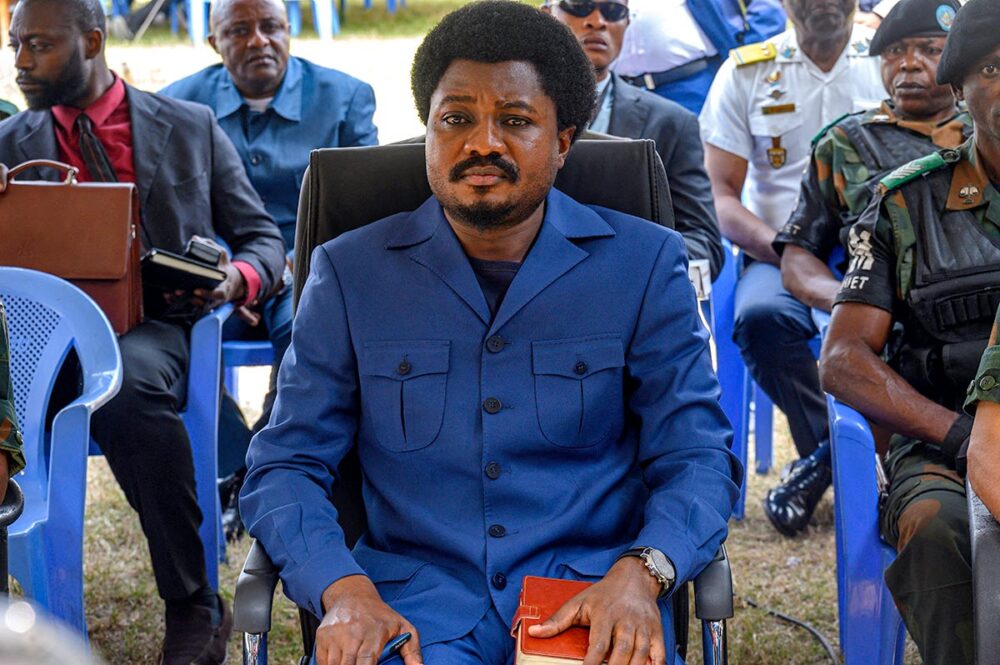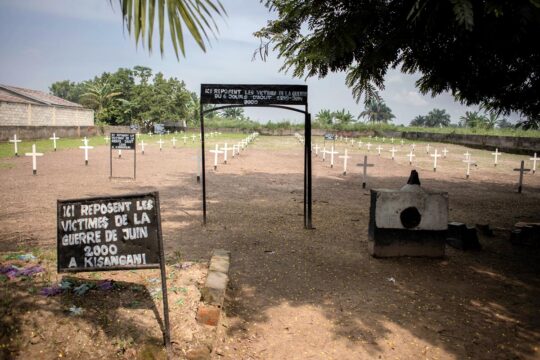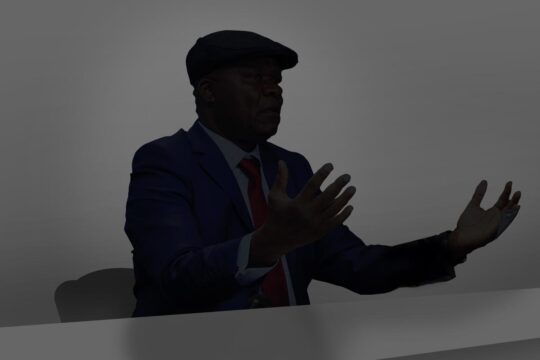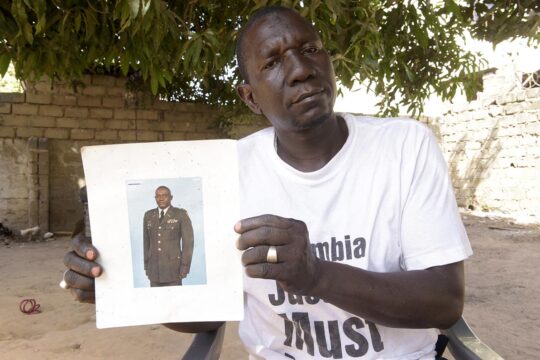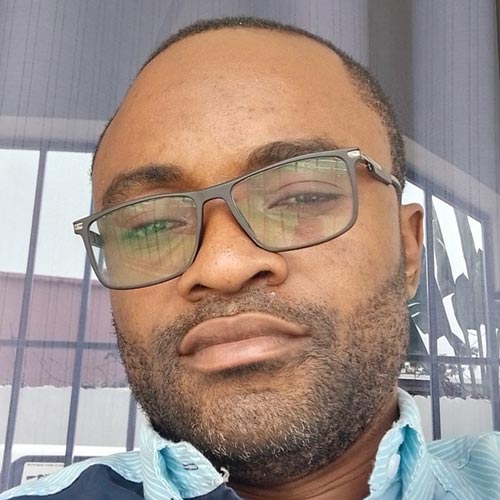Mutamba was used to mobilizing crowds and making spectacular media appearances, as he did on March 3 at the cultural centre in Kinshasa. Speaking at an awareness campaign against corruption, ironically the minister threatened legal action against those who “embezzled” public funds. “If we arrest ten thieves of public money, it will already be an effective method of raising awareness,” he told a crowd of more than 2,000 young people.
Dressed in his traditional style with white shirt, rolled-up sleeves, “abacost” suit and cane in hand like former President Mobutu, Mutamba cut a fine figure. But the young justice minister, 37, spent only a year in government.
Now he finds himself alone to face his fate. For the past few days, the noose has been tightening around him. Mutamba can no longer count on the support of the dozens who came to welcome him at Kinshasa’s N'djili airport at the end of May as he returned from his last trip as minister.
And he can count even less on the support of those who accompanied him to the public prosecutor’s office in early June when he was first summoned. He now faces charges of “embezzling public funds”. Since June 16, he has been banned from leaving Kinshasa at the request of the courts. On June 17, he handed his resignation to Congolese President Félix Tshisekedi, who accepted it.
In the DRC, legal proceedings against a government member -- unless they are caught red-handed -- require a green light from the lower house of parliament. This has now been given. Members of parliament responded favourably to the Court of Cassation Attorney General’s arguments on June 6. It follows a judicial investigation for which the prosecutor obtained parliament’s authorization on May 29. In this preliminary phase, Mutamba has been heard twice by Advocate General Sylvain Kalwila, on June 3 and 6. For a third hearing on June 9, he was represented by his lawyers.
After several hours of hearings, Mutamba’s arguments did not convince the prosecution. “Mr. Mutamba’s statements did not provide any evidence to refute the charges against him. On the contrary, his explanations further clarified the facts of the case against him and his clear intention to embezzle public funds,” said Attorney General Firmin Mvonde.
Transaction intercepted by intelligence services
The case stems from plans to build a prison in Kisangani, the provincial capital of Tshopo in the north-east, which was the scene of the “six-day war” between the Rwandan and Ugandan armies in June 2000. The total cost of the project is $39 million. On April 16, a sum of $19.9 million was transferred on Mutamba’s order from the account of the Fund for Reparation of Victims of Uganda’s Illegal Activities in the DRC (FRIVAO) to an account that was not the one cited in a contract between the Justice Ministry and Zion Construction SARL signed two days earlier. It is a current account at a different bank, according to the prosecutor.
This “suspicious” transaction was intercepted by the National Financial Intelligence Unit, CENAREF. “The funds held [in the current account] are the exclusive property of the account holder. It was the seizure by CENAREF and then the Attorney General of the Court of Cassation that made these funds unavailable,” Mvonde notes in his request.
The public prosecutor’s office criticises the justice minister in particular for: absence of government authorization for the construction of a prison; failure to comply with the procedure for awarding contracts; awarding the contract to a “front” company with no registered office, no qualified staff, no proven experience and no financial guarantees; and changing the destination of public funds meant to repair the harm caused by Uganda’s illegal activities in the DRC.
Mutamba on the defensive
During his hearings, Mutamba claimed to have received verbal authorization from the government on November 8, 2024 for construction of the prison. The prosecutor replied that the cabinet on that day referred to temporary detention centres to be built in Kinshasa and at sites yet to be identified, not in Kisangani.
Mutamba also maintains that he obtained special prior authorization for the award of the contract. Here Mvonde said the Directorate General for Public Procurement Control (DGCMP)’s acting head had stated in the minutes that he had been subject to “pressure and threats” from Mutamba to grant this authorization, without the required documents being produced.
With regard to Zion Construction SARL, the company awarded the contract, the minister admitted to the prosecutor that he had not bothered to check the actual existence of the company, its work or its staff. The shareholders remain untraceable and are the subject of search warrants, Mvonde revealed. In Kisangani, no site has been found to house the prison.
Who is Constant Mutamba?
If this case is making headlines, it is also because of the person involved. Close to former President Joseph Kabila and a member of his Common Front for Congo (FCC), Mutamba left that political group in 2021. Together with his companion Agée Matembo, he then created another one, the Dynamique Progressiste Révolutionnaire (DYPRO), which presents itself as the “republican” opposition. He ran for president in 2023 under the DYPRO banner, but like other contenders obtained less than one per cent of the vote.
In May 2024, while he was still in opposition, President Tshisekedi appointed him Minister of Justice. Upon taking office, he promised to build a special prison for embezzlers. In August, he suspended FRIVAO’s first steering committee and put it at the disposition of the judicial authorities. In November, he organized a national reflection on justice, which was supposed to find appropriate remedies for the “ailing” Congolese justice system. Six months later, he was forced to resign and face justice himself. Mutamba spent much of his life in Kisangani. He must now answer for the embezzlement of funds intended for the victims of war in Kisangani, a war that he experienced himself.
Lack of transparency
The victims of atrocities committed in Kisangani have been waiting for reparations for more than 20 years. According to an International Court of Justice (ICJ) ruling in 2022, Uganda must pay the DRC $325 million over five years. This sum is managed by FRIVAO. Three instalments have already been paid between 2022 and 2024, totalling $195 million.
On June 5, anniversary of the “six-day war” (June 5-10, 2000), Amnesty International published a report entitled “Congo: does anyone care? 25 years of impunity for the six-day war in Kisangani”, which drew the Congolese authorities’ attention. “In 2024, victims finally began to receive compensation, but the institution created by the DRC to receive and distribute funds from Uganda has been heavily criticised,” said Amnesty International. Among the obstacles to reparations is the perennial issue of victim identification. Victims accuse the public institution of opacity in its management. The current committee, set up by Mutamba, has not been spared either. “There is no transparency in the management of this fund. How did we go from 3,000 victims in 2021 to nearly 20,000 today? Where did the others come from?” said an outraged victim from Kisangani, who requested anonymity. “We don’t know who is a real victim and who is not. I meet victims who remain on the waiting list for reparations.
“I feel unsafe just because I am advocating for the victims,” she told Justice Info, adding that victims are kept out of the management of the fund intended for them. As a result, they cannot say with certainty whether there has been embezzlement or not, or by whom. “Even when Uganda pays the instalments, we are only informed via social media,” she laments. “If there has been embezzlement, no one should be spared.” The director general of FRIVAO did not respond to our requests for comment.
Settling scores?
The Congolese are also questioning the motives behind the proceedings. Opinions differ, including on social media. While some welcome “the fight against corruption”, others condemn it as “a political trial or a settling of scores”.
The relationship between the accused Mutamba and Attorney General at the Court of Cassation Mvonde has been a particular focus of debate. In November 2024, the justice minister launched investigations into Mvonde’s acquisition of a property worth €900,000 in Brussels. In a letter dated June 10, Mutamba mentions this case. He seeks recusal of prosecutor Mvonde and all the magistrates in his office, denouncing “relentless persecution and a political conspiracy”. Fearing “a settling of scores”, the young minister says he wants to “prevent bias” and benefit from a “fair investigation”.
In his letter of resignation addressed to President Tshisekedi on June 17, Mutamba proclaims his innocence. “I am surprised by this stab in the back,” he says. “I have never compromised my values and I will not do so. I have not taken a single dollar from the state.”
“They must all answer for their actions”
Civil society has been quick to react. On June 16, the Lucha (Struggle for Change) movement called for Mutamba’s resignation, as well as an audit of the two public institutions dedicated to victim compensation: the National Fund for Victim Compensation (FONAREV) and FRIVAO. The two institutions are “systematically used to siphon off public money for the benefit of a few individuals in high places” said the citizens’ movement, calling it “an insult to the memory of the victims and further torment for the survivors”.
The Centre for Research on Public Finance and Local Development (CREFDL) thinks Mutamba’s prosecution is a positive step. But it must be seen through, says its national coordinator Valery Madianga. “The justice system must be transparent in its proceedings. The company that unduly won the contract must also be prosecuted, along with all those who worked in the public spending system and those who facilitated the payment. It’s not just a question of the minister standing trial, but rather the entire system that allowed this to happen. They must all be held accountable for their actions,” says Madianga.


